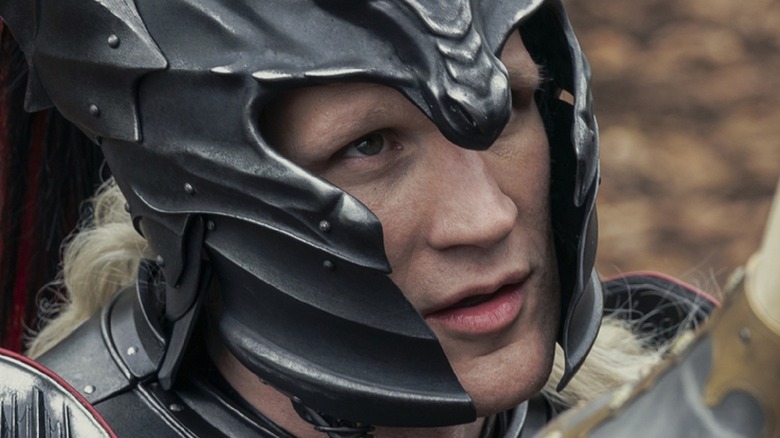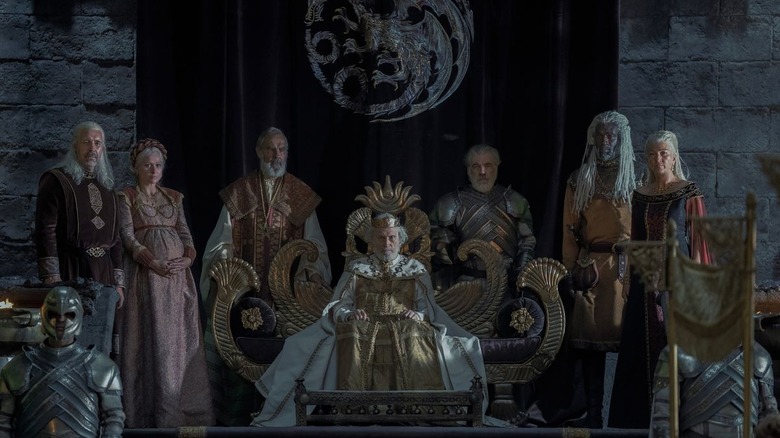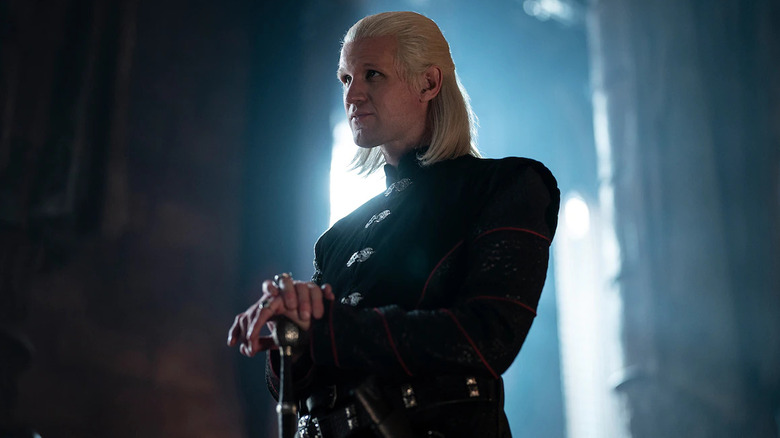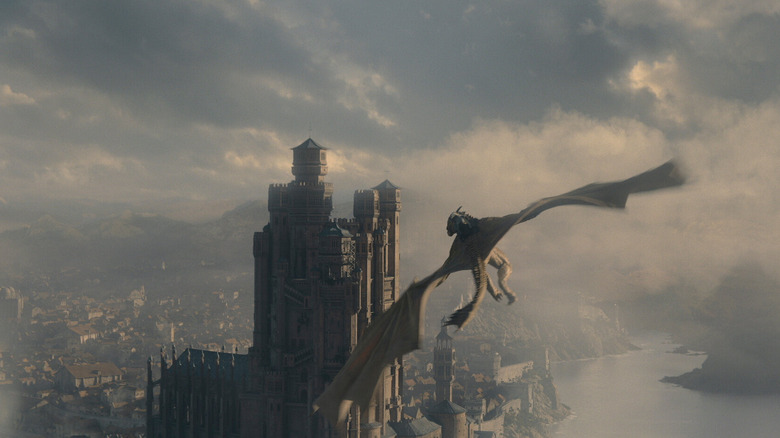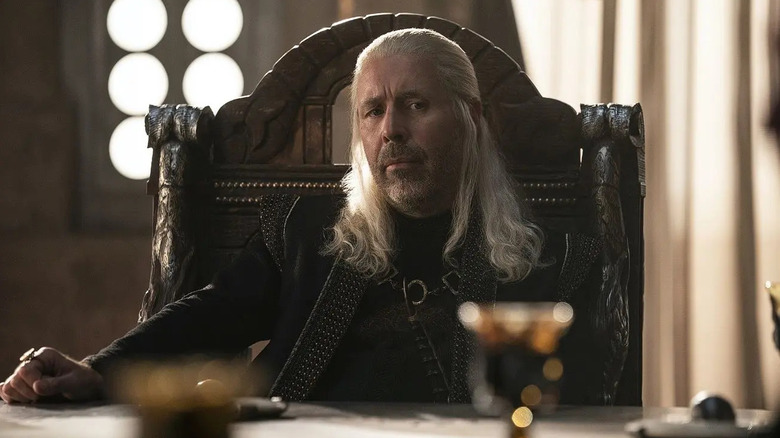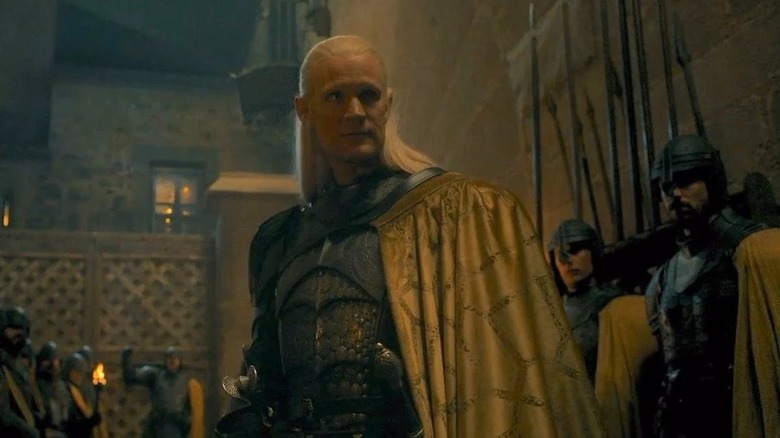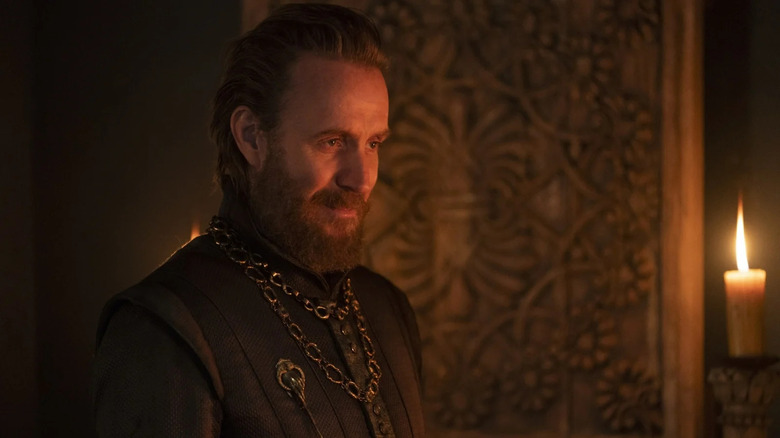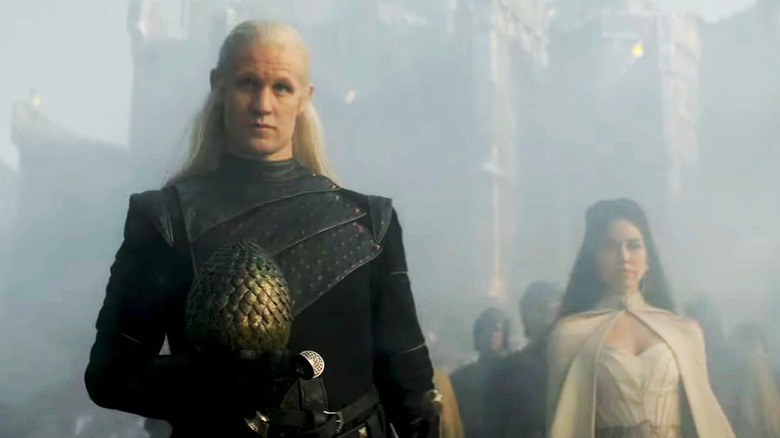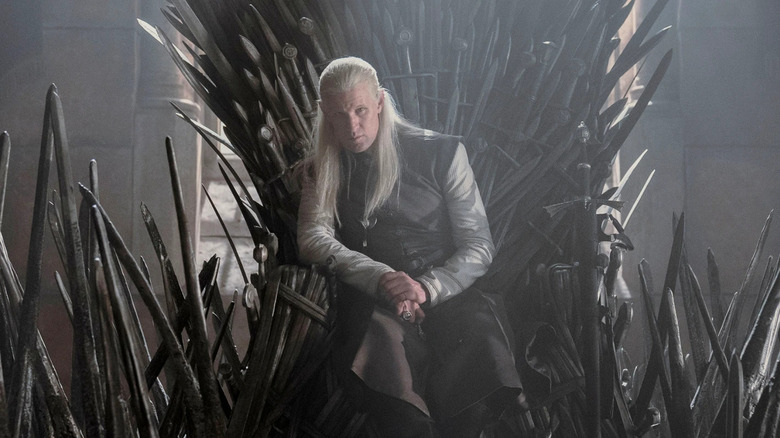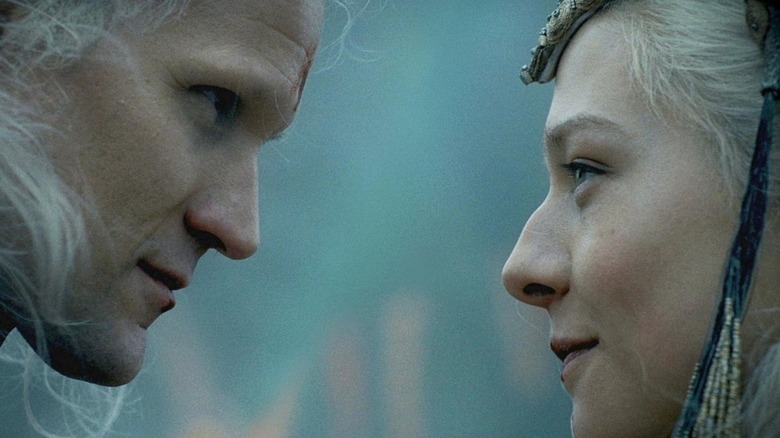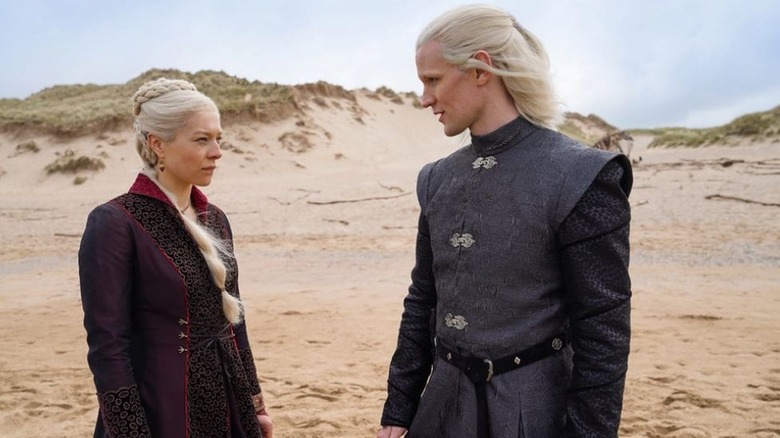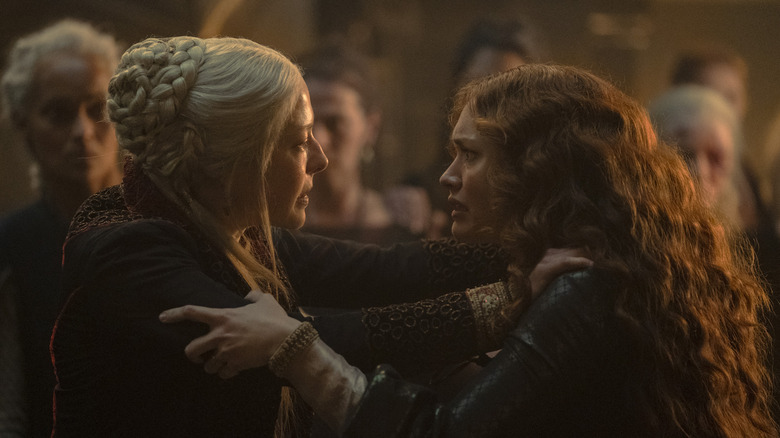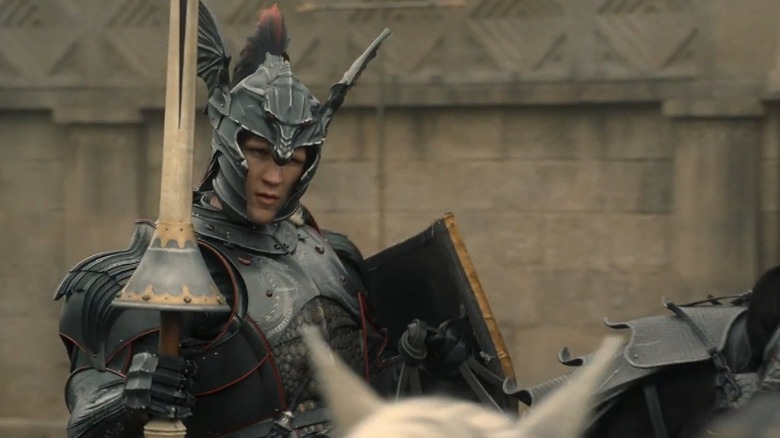The Untold Truth Of Prince Daemon Targaryen From House Of The Dragon
The fantasy world of George R.R. Martin is returning to HBO with "House of the Dragon." This prequel series takes place 200 years before the events of "Game of Thrones" and focuses on the Targaryen family at the height of their rule. It takes inspiration from the author's supplementary texts, primarily 2018's "Fire & Blood," which is written in the style of nonfiction, compiled of (fictional) found histories. "House of the Dragon" will have as many complex characters and as much palace intrigue, torrid romance, and graphic violence as "Game of Thrones," just with much more silvery-white hair — not to mention more dragons.
Once again, social climbers will try to outwit each other for the Iron Throne. In the game in which you either win or die, one of the most prominent players is Prince Daemon Targaryen, portrayed by Matt Smith in the HBO Series. In true "Game of Thrones" style, Daemon is morally ambiguous. He isn't entirely a hero, a victim, or a villain. Prince Daemon is handsome, battle-tested, and a bit of a cad. He's also moody, self-interested, and prone to turning on those to whom he was previously loyal without warning. He makes friends as easily as he makes enemies, and — thanks to his poor self control — he's often his own worst enemy. Here's everything you need to know about the sly prince.
His parents were siblings
This sordid detail from Daemon's ancestry is far less shocking if you've watched "Game of Thrones" or read any of George R.R. Martin's source material. The Targaryens were the only one of 40 Dragonlord families of Old Valyria to survive the Doom. They fled to Dragonstone and became the first dynasty to rule the Seven Kingdoms, which they did for almost three centuries until the death of the Mad King Aerys (the inciting incident of "Game of Thrones"). Targaryens kept many of their Valyrian beliefs and customs, including incestuous marriage. Weddings between siblings and cousins not only consolidated power, it allowed these preternaturally gifted humans to keep their gifts in the family. Famously, Targaryens have a way with dragons and are resilient to fire (though not wholly fireproof).
Prince Daemon's parents were Prince Baelon Targaryen and his sister-wife Princess Alyssa, both children of King Jaehaerys. Daemon was their second born after his older brother Viserys. Baelon and Alyssa enjoyed a happy marriage, which meant Daemon enjoyed a happy childhood... until tragedy struck. Shortly after giving birth to her third son, Aegon, Alyssa perished from complications, and the baby died within the year. Baelon was devastated, but he stuck to his duties as a warrior (his nickname was Baelon the Brave) and a public official. Though he served as Hand of the King and was named Prince of Dragonstone (an honor normally bestowed on the next in line) he never got the chance to sit on the Iron Throne as he succumbed to appendicitis during his father's reign.
He inherited a famous Targaryen sword
Prince Daemon was knighted by his grandfather, King Jaehaerys, upon his 16th birthday, having already shown great promise as a fighter. He had, however, simultaneously developed a reputation as something of a loose cannon in his youth. This notoriety was not entirely unearned. Around the time of his father's passing, the King bestowed upon him what had been his father's blade: Dark Sister. The Valyrian steel sword was one of only two that had been passed down from Targaryen to Targaryen for at least 100 years and probably much farther back than that. Its origins aren't precisely known, though it's assumed the weapon may have been forged for a woman or by a woman, since it's smaller, thinner, and lighter than its twin sword, Blackfyre. Both Targaryen women and men — such as Visenya and Baelor — have claimed and wielded Dark Sister.
Daemon lost an early tournament against his frequent adversary, Ser Cristen Cole, with Dark Sister by his side. But he and the ancestral weapon got to know each other better, and Daemon would go on to use the sword to conquer lands and slay his enemies. Though his reputation as a charismatic but petulant and untrustworthy wild child never abated, he also came to be appreciated as one of the most talented jousters and most fearsome warriors in Westeros, in no small part because of his skill and confidence with Dark Sister.
He rode the dragon Caraxes
Though she died when he was only a small child, Prince Daemon learned to ride dragons from his mother Alyssa, who first mounted him on the back of her own dragon, Meleys, when he was but a few days old. In his early 20s, Daemon claimed his late uncle Aemon's dragon, Caraxes, for himself. Caraxes had come of age with his mother's dragon in the Dragonpit, where he'd been given the moniker "Blood Wyrm" by the Dragonkeepers because he was the most vicious of the clutches. Prince Daemon's newly appointed steed was an excellent fit in terms of both physicality and temperament. Like Daemon, Caraxes was fast, strong, and intimidating, though he was also lean and nimble. He was just as ready to charge into battle and just as relentless when face to face with an enemy as was his rider.
Prince Daemon rode Caraxes for pleasure, for show, in combat, and as an escape vessel. Together, they conquered the Stepstones, toured the Free Cities of Essos, and fought in the Targaryen Civil War that pitted the Greens against the Blacks. Caraxes met his end during the Battle above the Gods Eye. Prince Daemon and Caraxes challenged Aemond Targaryen and his enormous dragon, Vhagar, to a fight above the vast lake with an island in the middle (hence its name) at Harrenhal. Caraxes took a bite to his underbelly and lost a wing, but he managed to land a fatal blow to Vhagar's throat, who fell dead upon the shores of the lake. A mortally wounded Caraxes died a little later outside of the walls of Harrenhal.
His older brother ascended to the Iron Throne
Had Baelon lived, he would have been next in line to rule the Seven Kingdoms, and Viserys would have presumably succeeded him. But with his own named heir gone, King Jaehaerys had to make a decision. He convened a Great Council composed of the Seven Kingdom's many lords to determine who should inherit the Iron Throne. There were two reasonable claimants (since women, bastards, and the King's only remaining son, a Maester, weren't considered). Viserys was the eldest child of the man who had been the King's eldest surviving son. But there was also Laenor Velaryon, the only son of Rhaenys Targaryen, herself the daughter of Jaehaerys' first born, Aemon. Aemon died before Baelon, but that hardly seemed to matter anymore.
Daemon supported his brother's claim and raised an army to show strength, while Rhaenys and her rich and powerful husband, Corlys Velaryon, assembled a fleet. The Council had much to deliberate. Viserys was 24 years old and in his prime. He'd already sired a daughter to continue the lineage in Rhaenyra. On the other hand, Laenor was only seven. However, he came with his father's unparalleled fortune. In the end, the Council decided to name Viserys the heir apparent. His maturity combined with the fact that he was already a fixture at King's Landing helped his cause, and the Council thought it best to keep power in the male side of the family. This allied Daemon to Viserys and against Corlys... for a while. Daemon had rallied for his brother mostly to improve his own claim to the crown.
He's the founder of the Gold Cloaks
King Jaehaerys passed away in his old age, freeing up the throne for King Viserys I. Prince Daemon was appointed to his Small Council, first as Master of Coin (the Westeros version of Treasury Secretary), then as Master of Laws (a post that put him in charge of advising the King and doling out justice). The hot-tempered and restless prince was ill-suited to these positions. He had no patience for bureaucracy and made enemies among the King's other advisors, particularly his Hand. Before long, King Viserys gave him a job that was much more to his liking: Commander of the City Watch.
In his new position, Commander Daemon was finally effective. The City Watch was a special palace force that patrolled and protected the streets of Kings Landing; they were relatively newly established and were somewhat rag-tag at the time of Daemon's appointment. The prince whipped them into shape, making them a considerably more regimented unit. He issued them a standard uniform based on his own attire (thus they became the "Gold Cloaks," as they have been referred to ever since) as well as standard weapons. He trained them, showed them respect, and grew their ranks to roughly 2,000 men.
During Daemon's tenure as Commander of the City Watch, Kings Landing experienced a two year period of safety and prosperity, as he and his men personally doled out justice through brutal punishments such as chopping off thieves' hands and the castration of rapists. The size of his personal army plus his newfound popularity made Prince Daemon a more powerful player in the game of thrones than he'd ever been before.
Ser Otto Hightower was his nemesis
Though Prince Daemon made enemies throughout his life, one followed him from his brother's ascension to his probable death. Ser Otto Hightower took over as Hand of the King when Daemon's father, Baelon, died. He served King Jaehaerys as well as King Viserys I in that capacity. That means Prince Daemon and Ser Otto Hightower were on the Small Council at the same time, when Daemon was Master of Coin and Law. They butted heads early, and it was Otto Hightower who suggested that King Viserys remove Daemon from the Small Council and stick him in some largely ceremonial post. His scheming turned out to be a mistake, as his role as Commander of the City Watch only elevated Daemon's stature.
Hightower would have given anything to keep Daemon away from the Iron Throne, so he publicly supported Viserys' daughter Rhaenyra as the rightful heir, though she was a young girl. Again, this put him at odds with Daemon, who believed himself to be a more sensible candidate. Hightower improved his station when King Viserys I chose to marry his daughter, Alicent, following the death of his first wife and cousin, Aemma Arryn, who passed during childbirth. But the ambitious advisor overplayed his hand. Years later, after Alicent had given Viserys sons (the Princess Rhaenyra was his only surviving child with Aemma), Hightower began to incessantly argue for their place in the succession. King Viserys grew tired of this and dismissed him. This rift would soon spill over into civil war, which would pit Daemon and Otto against each other yet again.
He was called Lord Flea Bottom for good reason
Daemon's post with the Gold Cloaks meant that he spent less time at court with the nobles and more time with the common folk of King's Landing, who lived — literally and figuratively — far outside the walls of the Red Keep. This won him the affection of citizens throughout the Kingdom, who bestowed upon him a new unofficial title: Prince of the City. But, since Daemon could so often be found in the city's many establishments of ill repute, he earned himself a second nickname, particularly among the working class: Lord Flea Bottom.
Daemon, who had always been rebellious and tempestuous, frequented brothels, partook in games of chance, and sometimes had too much to drink and spoke too openly in public about royal matters. His behavior became a point of contention between him and his brother, the King. Daemon took a dancer named Mysaria for his mistress, and when she became pregnant, he dared to present her with a dragon egg. This angered King Viserys, as Daemon was already married and the precious eggs were meant for legitimate Targaryen children.
Viserys demanded Daemon rescind the gift and he sent Mysaria back to Lys, where she lost the pregnancy. The prince further upset his brother when he was overheard drunkenly mocking Viserys's newborn son, who had died within a day of his birth. This was a slight too far. King Viserys officially named Rhaenyra Princess of Dragonstone (a promotion Daemon had long coveted) and his heir, essentially cutting his brother out of the line of succession.
He was a Rogue Prince in search of a kingdom
Of all the titles and superlatives that Daemon Targaryen collected throughout his life, "The Rogue Prince" was the one that stuck and the one that best described this dashing but dangerous character. Being a second born son of a second born son, Daemon always knew he was a long shot for the Iron Throne. But that didn't mean he wanted it any less. However, if he couldn't be Prince of Dragonstone and didn't have an immediate path to the crown at King's Landing, he'd take any kingdom he could get.
Daemon and his former rival at the Great Council, Corlys Velaryon, joined together to conquer the Stepstones, a chain of islands east of Dorne that had been troubled by piracy. The land itself didn't make for much of a kingdom, but the Stepstones' location made them important to lucrative sea trade, which interested Corlys. With Caraxes, Dark Sister, and a mighty fleet, Daemon declared himself King of the Stepstones and the Narrow Sea. Corlys even made him a crown, and King Viserys supported his brother playing at war because it kept him away from King's Landing.
Later, he tried to insert himself at Runestone, which had been his first wife's seat of power in the Vale of Arryn. He was not well-liked by the people of the Vale, mostly on account of how nasty he'd been to his wife. He was not only refused the throne at Runestone but turned away from the Vale altogether, which left him in an increasingly weakened position. The Rogue Prince may have been down, but he was not out.
He was thrice married
Like most noble men of his day, Daemon used marriage as a political tool. His first wife was chosen for him by his grandmother, Queen Alysanne, who used his betrothal to Lady Rhea Royce to strengthen King's Landing's hold over the Vale of Arryn. On paper, Daemon and Rhea were a solid match. In person, they hated each other and quickly became estranged. Daemon greatly disliked provincial life at the Vale. He returned to his home city and pleaded with his brother to dissolve their union, but the King refused. Daemon and Rhea produced no children, which was not surprising since the prince spent most of his time away from her and had publicly taken Mysaria as his mistress.
When Rhea died in a fall from her horse, Daemon had a chance to wed a woman of his choosing for reasons of his choosing. He asked Corlys Velaryon for his daughter Laena's hand in marriage. Taking Laena as his princess would tie him to the richest and one of the most influential families in the Seven Kingdoms. She was, however, promised to another man, but that was no matter. Daemon handily slew him in a duel to claim Laena as his wife. The wedding offended King Viserys, who hadn't given the pair his blessing first, as was customary. Viserys saw the marriage for what it was: A chance for Daemon to improve his standing. This was a better match that resulted in twin daughters, but — as so often happens in Westeros — Laena and what would have been Daemon's first son both lost their lives in childbirth. His next bride would be his last.
His third bride was his niece
Rhaenyra Targaryen had been favored by the king over his brother, which should have made them enemies. But uncle and niece were always fond of each other. When he traveled, he would bring her back exotic souvenirs and entertain her with tales of his adventures. Prior to his second marriage, it was rumored that the two had begun an affair, which caused yet another rift between the Rogue Prince and the King, who considered having his brother executed.
Viserys insisted that his daughter marry Corlys Velaryon's son, Laenor. Laenor had been the other claimant to the throne at the Great Council, and Viserys thought it prudent to tie up any loose threats to his family's supremacy. Rhaenyra relented, but was unfulfilled as Laenor was almost certainly gay. Though the couple did have three sons, they were allegedly fathered by her tournament champion, Ser Harwin Strong.
For a short time, Daemon and Rhaenyra were wedded to siblings Laena and Leanor Velaryon, and the foursome got along well. However, shortly after Laena died in labor, Leanor was killed in a suspicious incident while with a traveling companion. Gossip held that Daemon had paid the assassin so that he could marry a widowed Rhaenyra. There wasn't proof, but the prince and princess did wed.
Their union wasn't controversial because of their blood relation or age difference, but because, again, they didn't ask the King's permission and they didn't mourn for six months before tying the knot. Daemon may not have been a faithful husband to Rhaenyra — he brought Mysaria to court to serve as Mistress of Whispers and may have had a second mistress in a bastard Dragonrider named Nettles — but he was a faithful political supporter of his wife.
He vied for power in the Dance of the Dragons
As the largely peaceful reign of King Viserys I drew to its close, the aging monarch realized he had a looming crisis on his hands. He'd named his eldest daughter, Rhaenyra, as his heir, but she was a woman with what might be bastard children now married to his ne'er-do-well little brother. His wife, Alicent Hightower, maneuvered to have her sons, Aegon and Aemond, moved up the line of succession. They were boys legitimately born to the King, but Viserys found the Hightower family's naked ambition distasteful. Two factions emerged: the Greens and the Blacks, so named for the color of the dresses worn by Queen Alicent Hightower and Princess Rhaenyra Targaryen at a party to celebrate the king and queen's fifth anniversary.
Being married to the princess and heir apparent put Daemon squarely on the side of the Blacks, along with Corlys Velaryon and his wife Rhaenys. The Greens had amongst their ranks Otto Hightower and Ser Criston Cole. Tensions would simmer until the king died and his Small Council failed to agree upon a successor. When Criston murdered one of Rhaenyra's backers at a council meeting, the war began in earnest. Daemon, who stood to be at least Prince Regent and perhaps to even see his sons with Rhaenyra ascend to the throne one day, fought and won important victories for his wife upon his dragon, Caraxes. But the war would end, as most do, in a bloody mess that saw neither Rhaenyra nor Aegon wearing the true crown.
His death remains a mystery
The last record of Prince Daemon's existence is the account of the Battle Above the Gods Eye. Before the war, Alicent's second son, Aemond, had tried to ride and steal Daemon's second wife's dragon, Vhagar. Rhaenyra's sons caught him, and when a young Aemond began brutally beating his cousins, Rhaenyra's second born son, Lucerys, slashed at his face with his dagger, resulting in the loss of an eye. During the Dance of the Dragons — the Civil War between the Greens and the Blacks — Aemond got his revenge by murdering Lucerys. Daemon promised Rhaenyra "a son for a son," and challenged Aemond and Vhagar to a duel to the death.
Both men had similar reputations. Like the Rogue Prince, Aemond was known to be impulsive, unruly, and vindictive. It was a fair fight; though Caraxes instilled fear across the Seven Kingdoms, Aemond's dragon was the largest alive at that time. The airborne melee between the two infamous second-born sons began, and it was nothing short of epic. Flames lit up the sky, and the roaring of the dragons could be heard for miles around. When the dragons collided, Daemon leapt from Caraxes and stabbed Aemond in the socket of his missing eye with Dark Sister.
Both dragons and their riders plummeted to the lake below, all meeting their deaths — or so the history books say. Aemond's body (along with Dark Sister) was recovered, but Prince Daemon's remains were never found. Rumors that he survived the fight and decided to live in secret with Nettles spread, but he never resurfaced, making it far more likely that the Battle Above the Gods Eye was his final act.
